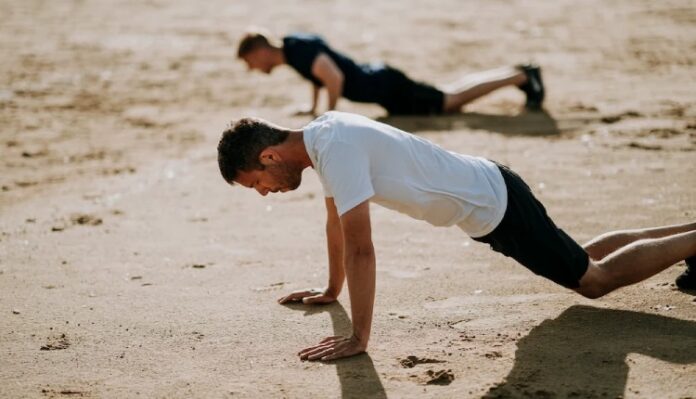We are all aware of the importance of regular exercise in sustaining a healthy lifestyle and accomplishing our fitness objectives. It keeps those endorphins flowing, gives us more energy, and builds our muscles.
It’s crucial to understand, though, that there can be a limit to good things in our pursuit of physical perfection. Yes, you heard correctly. There are actually some demerits of exercising too much. We’re going to discuss the negative aspects of excessive exercise in this blog post. Because a comprehensive and long-lasting exercise regimen depends on balance. We’ll look at the potential consequences of pushing our bodies past their boundaries.
We’re not here to dissuade you from working up a sweat, so don’t worry! Consider this as a gentle reminder to pay attention to your body and create a balance between pushing yourself and taking time to recover. We’ll delve into the negative effects of overtraining on the body and mind. We’ll also look at warning indicators to look out for and how to avoid letting them derail your fitness goals. So settle in, take a break, and let’s discuss the drawbacks of excessive exercise together. Your body will appreciate you for it, we promise!
How much exercise is too much?
Finding the precise limit of “too much” exercise can be difficult. Since it differs from person to person depending on things like fitness level, general health, age, and personal goals. But there are certain broad rules and indicators to keep in mind. Adults can exercise for at least 150 minutes per week at a moderate intensity, according to research. Exercising more than what is advised without adequate recuperation and rest, however, can have unfavourable effects.
Let us now take a look at those demerits in this blog.
Demerits of exercising too much:
Increased risk of injuries:
Stress fractures, sprains, and other types of injuries are more likely to occur when you overtrain without giving your body adequate time to heal. You should give your muscles, joints, and connective tissues enough time to recover and get stronger.
Weakened immune system:
The immune system can be weakened by intense and sustained exercise. And as a result, you’ll be more prone to diseases and infections. A healthy immune system can be maintained by allowing yourself time for rest and recuperation.
Hormonal imbalances:
In women specifically, excessive activity might upset the hormonal balance. It might result in irregular menstrual cycles, low oestrogen levels, or even problems with conception. Finding a balance that promotes your general well-being is essential.
Increased fatigue:
Chronic weariness can develop when your body is overworked without appropriate rest. Your performance and daily life can be hampered by persistent fatigue and exhaustion.
Decreased muscle gains:
Contrary to popular opinion, over-exercising might prevent muscles from growing. Muscles require time to heal and renew. You can hinder their development if you don’t give them enough time to heal.
Mental burnout:
Overtraining might result in motivational decline and mental exhaustion. Exercise should not be stressful; it should be fun and uplifting. Taking pauses and doing other things can help you keep a good outlook.
Disrupted sleep patterns:
Sleep patterns might be disturbed by intense exercise right before bed. It will be challenging to get a good night’s sleep. The rehabilitation of muscles, the functioning of the brain, and general health all depend on sleep.
Nutritional deficiencies:
Nutrient deficits can result from consistently pushing your body without adequate nutrition. To support your exercise goals, a well-balanced diet is essential for meeting your body’s increasing needs.
Social isolation:
Extreme fitness priorities could make you socially isolated. Relationships and general joy can suffer if you spend too much time exercising or put social activities on the back burner.
Increased risk of overuse injuries:
Overuse injuries such as tendonitis and bursitis can occur when the same muscles and joints are stressed repeatedly without proper recovery. These problems can be avoided by varying your workouts and allowing for recovery.
How to recover from the demerits of exercising too much?
For your body to be able to heal, restore, and find equilibrium, it’s imperative to recover from overexertion. Here are some useful tips for properly recovering:
Sleep and rest: Make getting a good night’s sleep a priority to encourage healing in the body and mind. Sleep for 7-9 hours each night, undisturbed. Incorporate rest days into your training schedule as well to provide your body time to recover.
Hydration: Hydration is important for recovery because it replaces lost fluids and helps muscles heal. Throughout the day, drink lots of water, especially after strenuous exercise.
Nutrition: Consume nutritious foods to offer your body the nutrition it requires to recover. Your meals should contain a balance of protein, carbs, and healthy fats. Choose healthy, whole foods instead, such as lean meats, fresh produce, whole grains, and nuts.
Stretching and gentle movement: Walking, yoga, or swimming are all low-impact exercises that can help with blood circulation and muscular stiffness. Include stretching exercises to increase flexibility and ease tension in the muscles.
Self-care practices: Give yourself the gift of relaxing practices like meditation and deep breathing exercises. To relieve stress and improve general well-being, try taking warm baths.
Listen to your body: Keep an eye out for any indications of discomfort, weariness, or a drop in performance. In order to avoid future strain or damage, adjust or lower the intensity of your workouts.
Consult a professional: Consult a medical expert if you’re in pain that won’t go away or if you’re worried about your recovery. They can offer tailored support and advice.
Keep in mind that after exercise, recovery is just as crucial. By including these healing techniques in your routine, you may accelerate your fitness progress and guarantee long-term well-being. Take good care of yourself, and good luck healing!


